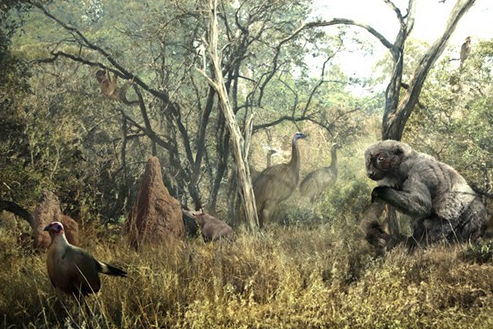I am looking for a PhD student to work on seed dispersal, connectivity and genomics of palms with megafaunal fruits on Madagascar – the position can be started as soon as possible, and the student will be located at the German Centre for Integrative Biodiversity Research (iDiv) in Leipzig, Germany.
Applications are accepted until 30th June 2018. To apply, see here: https://www.idiv.de/about_idiv/career.html
Or download the advertisement here.
A bit more background….

Extinct megafauna on Madagascar, image by VELIZAR SIMEONOVSKI
Madagascar harbours exceptional biodiversity, but this tropical hotspot also faces increasing threat from human activities and climate change. Plants with large, ‘megafaunal’ fruits are common across the flora of Madagascar, especially within the palm (Arecaceae) family. However, Pleistocene extinctions of large-bodied ‘megafaunal’ fruit-eating and seed-dispersing animals (such as giant lemurs) may have hindered the dispersal of taxa with megafaunal fruits. In this project we aim to investigate the micro- and macroevolutionary consequences of dispersal limitation for megafaunal-fruited palms on Madagascar, using a comparative framework. Specifically, we aim to (i) identify genomic signatures of dispersal limitation in megafaunal-fruited palm populations, (ii) reconstruct demographic history and identify historical genetic bottlenecks in these species, and (iii) evaluate whether these species may be adapting to dispersal by smaller-bodied frugivores, by evolving smaller fruits with smaller seeds. This project integrates the fields of plant evolution, phylogeography, and plant-frugivore interaction ecology. It will be in collaboration with researchers from Kew Botanical Gardens, UK (Dr. Bill Baker), Aarhus University, Denmark (Dr. Wolf Eiserhardt), the University of Amsterdam, the Netherlands (Dr. Daniel Kissling) and Botanic Garden of the Ruhr-University Bochum, Germany (Dr. Wolfgang Stuppy), among others.
Job description:
- collecting genetic samples from palm populations on Madagascar, and measuring their functional traits;
- identifying Malagasy frugivore communities and their functional traits;
- using novel genomic techniques (e.g. RAD sequencing) to infer connectivity, demographic history and phylogeographical patterns;
- writing and publishing of scientific papers in peer-reviewed journals;
- presentation of results at international conferences;
- participation in iDiv’s PhD training program yDiv.
Requirements:
Applicants should hold a Master’s or equivalent degree in a related field of research (e.g. ecology, (molecular) biology, genetics, phylogenetics, phylogeography). The successful candidate should be innovative, able to work on his or her own initiative, and willing to spend several months in the field (Madagascar). Therefore prior experience with tropical fieldwork and basic living conditions is advantageous. Furthermore, the successful candidate should have prior experience using molecular techniques, preferably with bioinformatics for large genetic/genomic datasets. An interest in acquiring additional necessary skills (e.g. programming) for handling and statistically analyzing large datasets is essential. Candidates should be team-oriented and have strong organizational skills, in order to manage this collaborative research project within an international consortium. Excellent English communication skills (speaking and writing) are required. We seek candidates with an independent mind and the ambition to publish in internationally leading journals.
Applications are accepted until 30th June 2018, the applicant is expected to start as soon as possible, but latest by September 2018.
For queries on the application process, please contact Dr. Nicole Sachmerda-Schulz (nicole.sachmerda-schulz@idiv.de); for research project questions, contact Dr. Renske Onstein (onsteinre@gmail.com).




